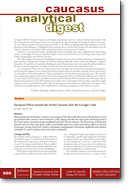Social Capital in Georgia

Author(s): Leslie Hough
Editor(s): Iris Kempe, Matthias Neumann, Robert Orttung, Jeronim Perovic, Lili Di Puppo
Series: Caucasus Analytical Digest (CAD)
Issue: 31
Pages: 2-5
Publisher(s): Center for Security Studies (CSS), ETH Zurich; Resource Security Institute (RSI), Arlington; Heinrich Böll Foundation, Tbilisi; Research Centre for East European Studies, University of Bremen
Publication Year: 2011
